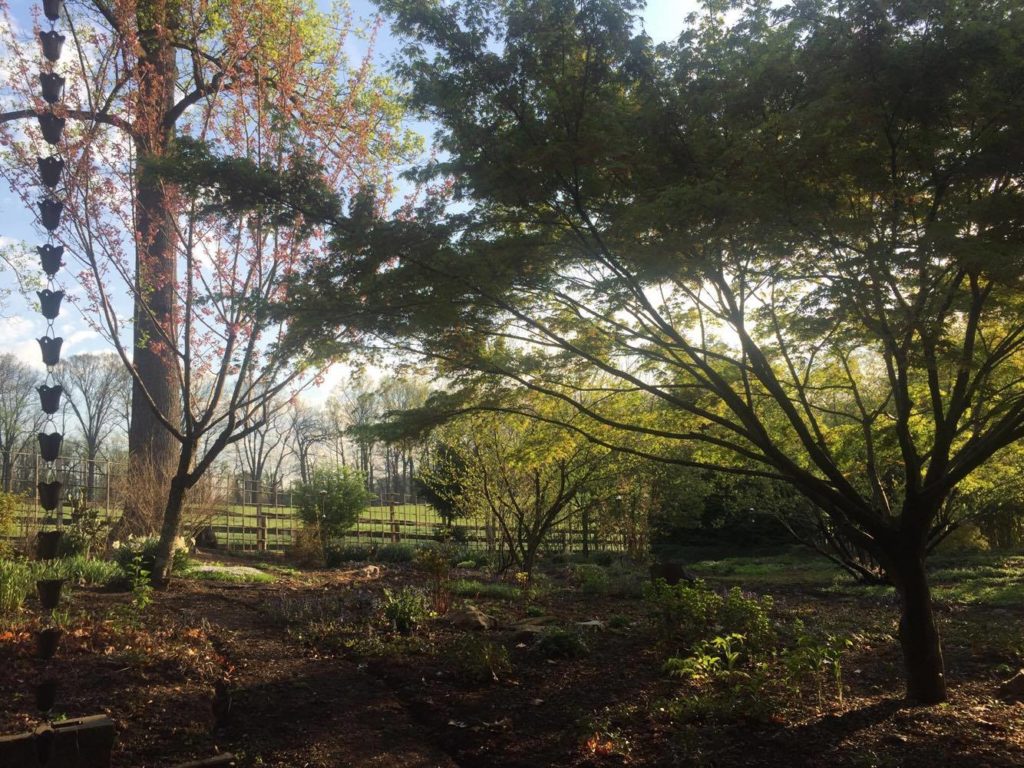
When I was a child, my parents worked in our yard. We lived in Waban, Massachusetts. Lots of rock. We had rock walls and rock gardens, with a very hilly, up-and-down-and-up terrain. Behind us was an aqueduct, and on the other side of that a swamp. Woods were everywhere. So there was cultivated and wild land. I wasn’t involved in the cultivating part of my world; I watched.
In 1976, when I first went to Ganeshpuri, I encountered an amazing garden: seventy-five acres of ashram with cultivated gardens amidst the jungle. As Kipling said, the jungle could come in so quickly. The world was teeming with life and it needed to be disciplined. Baba walked the gardens most days. My first job was to maintain security, so I walked the ashram gardens daily. The perimeter was important. I always had to check for the influx of the jungle one way or another—not that it could be completely kept out. The jungle and the people had a working relationship.
Most ashramites worked in the garden as their guruseva (service). They learned to weed, dig, compost and plant. It meant steady, everyday effort. A dear friend, Mark, was in charge of the garden. Venkapa, whom I loved dearly, was in charge of the physical plant. Baba directed everything, even at one time directing Mark to plant roses. All this was for our benefit; we learned how to take care of the world.
In the 1990s, I lived in a church rectory on church grounds. My two sons were young, and my then husband was the priest. He had been in Ganeshpuri and had worked in the garden. He wanted a garden for the church, so he built a garden that had a Japanese flavor. There were many beautiful specimens and a pond made from rock. It was lovely. But no one worked in the garden. No one tended the garden. And the garden was rather rigid and formal. It was not very inviting, and the parishioners did not venture in unless something specific was happening there. No one volunteered to keep it up. Decay and weeds intermingled very quickly. From the beginning, my children and I were forced labor in this garden. It was never our garden.
Many years after we had left and the priest had been defrocked, we returned to find that, though the parish was still there, the jungle had moved in. No one had felt it was the church’s garden. Now, English ivy had smothered the variety of plantings. No one would have known what had once been there.
When my sons and I moved to our present home seventeen years ago, the yard was without trees or even worms. Clay was the essential element of the property. Gradually, we planted a garden; I always kept Baba in mind, the upper garden where I had walked both on my own and gratefully with Baba on his daily walks.
In 2005, we started our visits to Cambridge in the UK. There the gardens are tended with great care and love. They reminded me of Baba’s ashram. We feel the welcoming and the expanse and the harmony. There is no struggle, no fight. Nature, though perfectly cultivated and controlled, is not tight, rigid and unwelcoming.
Over the years, I have directed our own garden’s expansion, so that now there is very little grass left. We can walk on paths in the shade of the trees we planted years ago, and enjoy the different layers of growth. Like Baba’s gardens, it is a place for quiet and reflection.
This weekend we will be working in the garden spreading mulch. We have done this every year since the garden began. Why should we take this trouble? Why do this? In Baba’s ashram we worked every day, internally and externally. Both complemented each other. If we only work internally, we become self-absorbed and lost in our my-ness. If we only work outside we become superficial and lost in the material plane without any understanding of its cause. But when we are with our experience, let whatever comes up come up from that vibration, and then function appropriately because we are now discerning from within, we are able to truly practice and weed out what is not true.
Many spiritual and literary traditions use tending a garden as a metaphor for the work of life. Here, the garden is truly a metaphor for sadhana. Our job is to work over a long time without interruption and with great devotion. The garden receives steady care, and the weeds disappear and remain, for the most part, gone. Love is the ground of the garden.
Share this Post
